![Solidal “low-cost”holiday in Argentina]()
Feb 20, 2016 | Non categorizzato
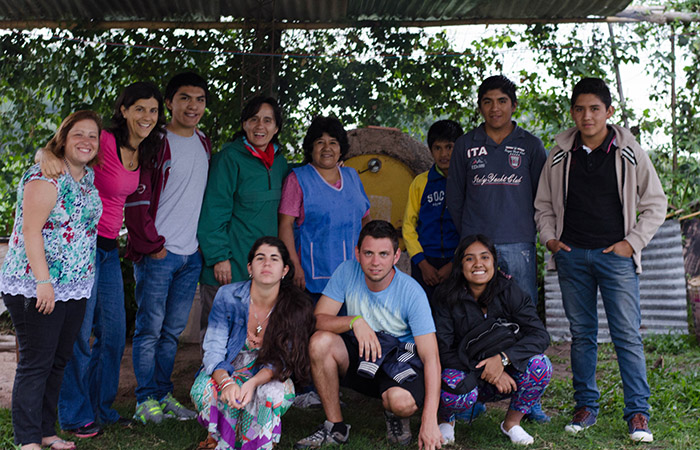 In El Espinal, a town in the province of Salta, Northern Argentina, 35 young people aged 18 to 30 from Argentina and Paraguay spent time together from 3 to 11 January, for a low-cost holiday but of “elevated levels of unity,” as they called it. In fact, also the Pastoral for Tourism –Programme for the Development of Solidal Tourism of that region also signed up for this project. This concerned firstly, living with the community and youth of the place, sharing their work in the tobacco fields with the beehive breeders and weavers, and also the typical difficulties of daily living in the countryside: cold water, lack of electricity, the mud that seems to seep through everywhere… The first point was: leaving behind commodities and prejudice. The Golden Rule “Do to others what you would like others to do to you” expressed in a nutshell what the youth of the Focolare wanted to fulfill in that community. But how were they supposed to accomplish it? It was first of all through an infinity of simple acts of love, and then with a cinema forum, meetings, an excursion, moments of relaxation, eating, dancing and singing together.… But the message was conveyed also through theatre plays that showed how El Espinal would be if everyone lived this simple rule. And who knows why this was so – perhaps for that reality “give and you shall be given” which always comes true – a competition of love triggered, where all gave their best. Maga recounts: “We will never forget how Pilar, a weaver, brought the best set of cutlery she had, to offer us a savoury soup, not to mention the ladies who set their chores aside to come and bake bread with us, and the enthusiasm of the boys and girls who fried doughnuts until late t night to make us feel at home. Then there were those who hosted us in their homes, giving us all they had to make us comfortable. There were so many new faces: and in each was Jesus who came towards us every time.” But the so-called holiday also had another objective, and this was to engage in a project to develop the Tourism Pastoral, which consisted in helping the population to see the touristic potential of their town. This was the main aim behind the organisation of activities that could later be transformed into concrete proposals for future visitors: trekking along the river, horseback riding, tractor excursions, and sight-seeing in the enchanting and hidden places of El Espinal.
In El Espinal, a town in the province of Salta, Northern Argentina, 35 young people aged 18 to 30 from Argentina and Paraguay spent time together from 3 to 11 January, for a low-cost holiday but of “elevated levels of unity,” as they called it. In fact, also the Pastoral for Tourism –Programme for the Development of Solidal Tourism of that region also signed up for this project. This concerned firstly, living with the community and youth of the place, sharing their work in the tobacco fields with the beehive breeders and weavers, and also the typical difficulties of daily living in the countryside: cold water, lack of electricity, the mud that seems to seep through everywhere… The first point was: leaving behind commodities and prejudice. The Golden Rule “Do to others what you would like others to do to you” expressed in a nutshell what the youth of the Focolare wanted to fulfill in that community. But how were they supposed to accomplish it? It was first of all through an infinity of simple acts of love, and then with a cinema forum, meetings, an excursion, moments of relaxation, eating, dancing and singing together.… But the message was conveyed also through theatre plays that showed how El Espinal would be if everyone lived this simple rule. And who knows why this was so – perhaps for that reality “give and you shall be given” which always comes true – a competition of love triggered, where all gave their best. Maga recounts: “We will never forget how Pilar, a weaver, brought the best set of cutlery she had, to offer us a savoury soup, not to mention the ladies who set their chores aside to come and bake bread with us, and the enthusiasm of the boys and girls who fried doughnuts until late t night to make us feel at home. Then there were those who hosted us in their homes, giving us all they had to make us comfortable. There were so many new faces: and in each was Jesus who came towards us every time.” But the so-called holiday also had another objective, and this was to engage in a project to develop the Tourism Pastoral, which consisted in helping the population to see the touristic potential of their town. This was the main aim behind the organisation of activities that could later be transformed into concrete proposals for future visitors: trekking along the river, horseback riding, tractor excursions, and sight-seeing in the enchanting and hidden places of El Espinal. 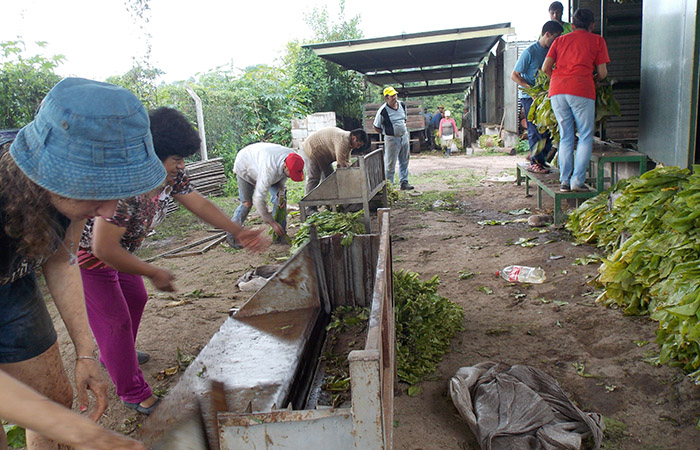 Among the breathtaking landscapes, sudden climate changes, the sun, animals and insects – at times not valued – everyone felt they could “feel God’s presence and the embrace of his creation” and also the relationships established among the youth, which were really enriching. In short, they spent a different type of holiday in the beautiful province of Salta, while adhering to Pope Francis’ invitation to live the Gospel in the outskirts. Before returning to their cities, they expressed their impressions: “I learnt a lot of things: to be happy with the little we have and not to complain, and live the golden rule. I felt loved and welcomed. All has left a deep mark in me. It was the best way to start the year. Thanks to you all, I have come closer to God.” Other impressions: “We shall leave with our hearts full of stories, experiences, their values, life, light and joy. I again discovered that if we live together for the others, everything else will come as an extra enrichment.” But also the local youth expressed themselves: “You are the best friends Jesus has given me.” “You have filled us with smiles, joy and peace.” Dominga wrote a prayer which she shared with us: “Thank you Jesus for being here and for giving me so many brothers as a gift. I discovered You in each one of them. Lord, teach us to dream big, and of beautiful things that expand our hearts.”
Among the breathtaking landscapes, sudden climate changes, the sun, animals and insects – at times not valued – everyone felt they could “feel God’s presence and the embrace of his creation” and also the relationships established among the youth, which were really enriching. In short, they spent a different type of holiday in the beautiful province of Salta, while adhering to Pope Francis’ invitation to live the Gospel in the outskirts. Before returning to their cities, they expressed their impressions: “I learnt a lot of things: to be happy with the little we have and not to complain, and live the golden rule. I felt loved and welcomed. All has left a deep mark in me. It was the best way to start the year. Thanks to you all, I have come closer to God.” Other impressions: “We shall leave with our hearts full of stories, experiences, their values, life, light and joy. I again discovered that if we live together for the others, everything else will come as an extra enrichment.” But also the local youth expressed themselves: “You are the best friends Jesus has given me.” “You have filled us with smiles, joy and peace.” Dominga wrote a prayer which she shared with us: “Thank you Jesus for being here and for giving me so many brothers as a gift. I discovered You in each one of them. Lord, teach us to dream big, and of beautiful things that expand our hearts.”
Feb 19, 2016 | Non categorizzato
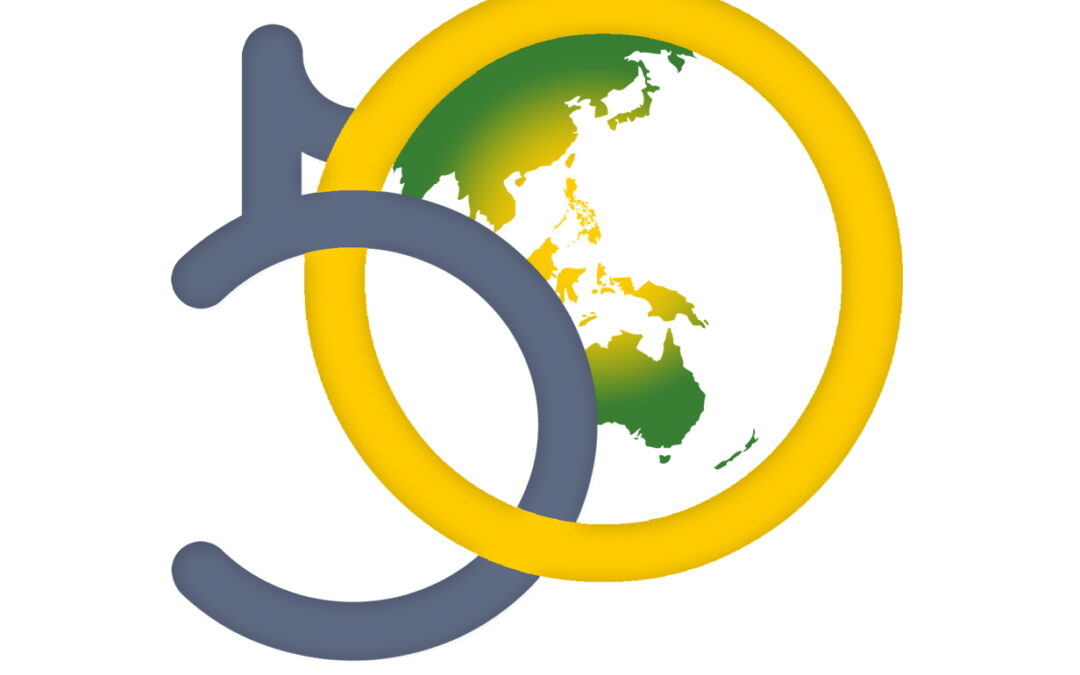
Feb 19, 2016 | Non categorizzato
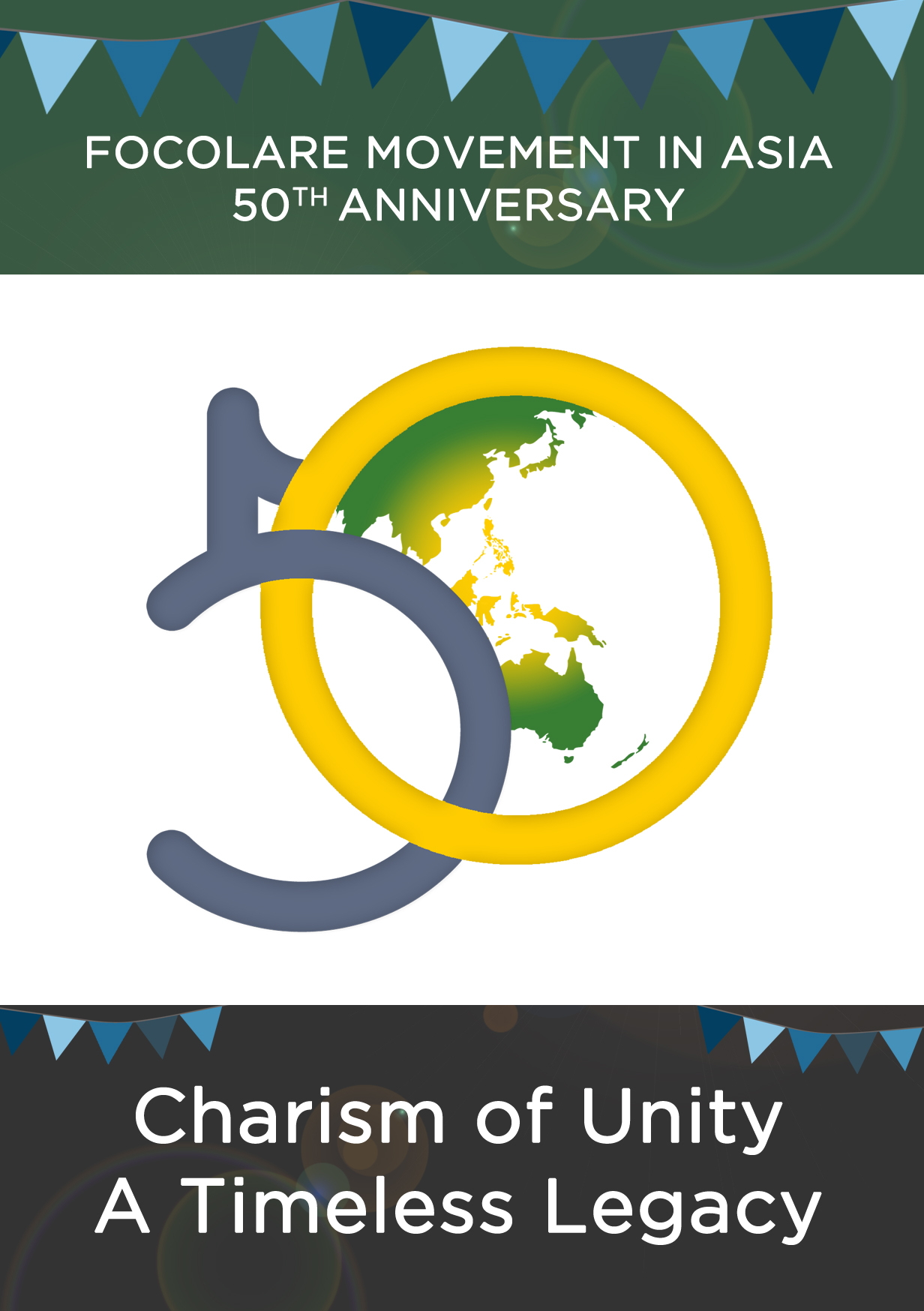

Feb 19, 2016 | Non categorizzato
Live streaming: http://www.ustream.tv/channel/feb-2013-celebration
 Fifty years ago, on February 22, 1966, a group of five men and women focolarini arrived in Manila. They were sent by Chiara Lubich in response to the request of Cardinal Rufino Santos, then Archbishop of Manila. Guido Mirti, Giovanna Vernuccio, Silvio Daneo, Ednara Tabosa and Magdalena Brandao were the first protagonists in the adventure of the Focolare in Asia. From Manila, they travelled to Japan, Korea, Hong Kong, Taiwan, India, Pakistan, Thailand, Cambodia, Vietnam … as far as Australia. The Focolare Movement spread widely throughout Asia fostering in all those who came into contact with it the spirit of unity that is its characteristic, in spite of the enormous diversity of cultures, religions and languages present in the region. “In 2016, we are planning a series of events to thank God for these fifty years of abundant graces, fruit of the meeting of the charism of unity,” write Ding Dalisay and Carlo Maria Gentile, from the Philippines. “On February 20 and 21, the whole family of Chiara present in this part of the world will gather together in Mariapolis Peace, in Tagaytay (Philippines). The first day will be ‘a homecoming’, back to our family; while on the second day, there will be a feast of thanksgiving, with artistic and cultural presentations, looking back at the story of these fifty years, to encourage us to go on, with new fervor, and continue offering our contribution towards the unity of the human family. On that occasion we will present the centers that have come up in the ‘little city’ Mariapolis Peace, at the service of the Movement throughout Asia: the School of the Oriental Religions (SOR), the Mariapolis Center, the Schools for the youth, the Centre for Priests, the House of the Seminarians, the Centers for Men Religious and for Women Religious, and the Bukas Palad and Pag-asa Social Centers. Several delegations are expected, from Korea, Japan, China, Indonesia, Thailand, Vietnam, Myanmar, India, Pakistan and Australia. Among the participants will be some among the first members of the Movement in the Philippines who have now permanently moved to the USA, thereby enriching the Focolare community in that country. The guests of honor will be the protagonists of those first times of the Focolare in Asia, who are now residing in Italy, Guatemala and Malta.” “On March 14, death anniversary of Chiara Lubich (January 22, 1920 – March 14, 2008),” continue Ding and Carlo Maria, “a Symposium will be held in Manila, on the theme: Charism of unity, a timeless legacy. This is especially intended for ecclesiastical and civil personalities so that together we may be able to reflect on the contribution that the charism of Chiara Lubich has given to the life of individuals, to communities, to the Church and society.” “In the various Mariapolis that will take place in the course of the year in the Philippines (in Davao, Cebu and Manila), they explain, one whole day will be dedicated to giving as many people as possible the opportunity to know the vitality that the spirituality of unity has brought to Asia in the fifty years of its presence here.” “Asia is also home to the great religions: Buddhism, Hinduism, Islam … For this reason, in 2017, in Thailand,” they conclude, “the 50th anniversary of the Focolare Movement will feature an interreligious event: it will be an invitation to all those who wish to join us in this walk towards the unity of the human family.”
Fifty years ago, on February 22, 1966, a group of five men and women focolarini arrived in Manila. They were sent by Chiara Lubich in response to the request of Cardinal Rufino Santos, then Archbishop of Manila. Guido Mirti, Giovanna Vernuccio, Silvio Daneo, Ednara Tabosa and Magdalena Brandao were the first protagonists in the adventure of the Focolare in Asia. From Manila, they travelled to Japan, Korea, Hong Kong, Taiwan, India, Pakistan, Thailand, Cambodia, Vietnam … as far as Australia. The Focolare Movement spread widely throughout Asia fostering in all those who came into contact with it the spirit of unity that is its characteristic, in spite of the enormous diversity of cultures, religions and languages present in the region. “In 2016, we are planning a series of events to thank God for these fifty years of abundant graces, fruit of the meeting of the charism of unity,” write Ding Dalisay and Carlo Maria Gentile, from the Philippines. “On February 20 and 21, the whole family of Chiara present in this part of the world will gather together in Mariapolis Peace, in Tagaytay (Philippines). The first day will be ‘a homecoming’, back to our family; while on the second day, there will be a feast of thanksgiving, with artistic and cultural presentations, looking back at the story of these fifty years, to encourage us to go on, with new fervor, and continue offering our contribution towards the unity of the human family. On that occasion we will present the centers that have come up in the ‘little city’ Mariapolis Peace, at the service of the Movement throughout Asia: the School of the Oriental Religions (SOR), the Mariapolis Center, the Schools for the youth, the Centre for Priests, the House of the Seminarians, the Centers for Men Religious and for Women Religious, and the Bukas Palad and Pag-asa Social Centers. Several delegations are expected, from Korea, Japan, China, Indonesia, Thailand, Vietnam, Myanmar, India, Pakistan and Australia. Among the participants will be some among the first members of the Movement in the Philippines who have now permanently moved to the USA, thereby enriching the Focolare community in that country. The guests of honor will be the protagonists of those first times of the Focolare in Asia, who are now residing in Italy, Guatemala and Malta.” “On March 14, death anniversary of Chiara Lubich (January 22, 1920 – March 14, 2008),” continue Ding and Carlo Maria, “a Symposium will be held in Manila, on the theme: Charism of unity, a timeless legacy. This is especially intended for ecclesiastical and civil personalities so that together we may be able to reflect on the contribution that the charism of Chiara Lubich has given to the life of individuals, to communities, to the Church and society.” “In the various Mariapolis that will take place in the course of the year in the Philippines (in Davao, Cebu and Manila), they explain, one whole day will be dedicated to giving as many people as possible the opportunity to know the vitality that the spirituality of unity has brought to Asia in the fifty years of its presence here.” “Asia is also home to the great religions: Buddhism, Hinduism, Islam … For this reason, in 2017, in Thailand,” they conclude, “the 50th anniversary of the Focolare Movement will feature an interreligious event: it will be an invitation to all those who wish to join us in this walk towards the unity of the human family.”
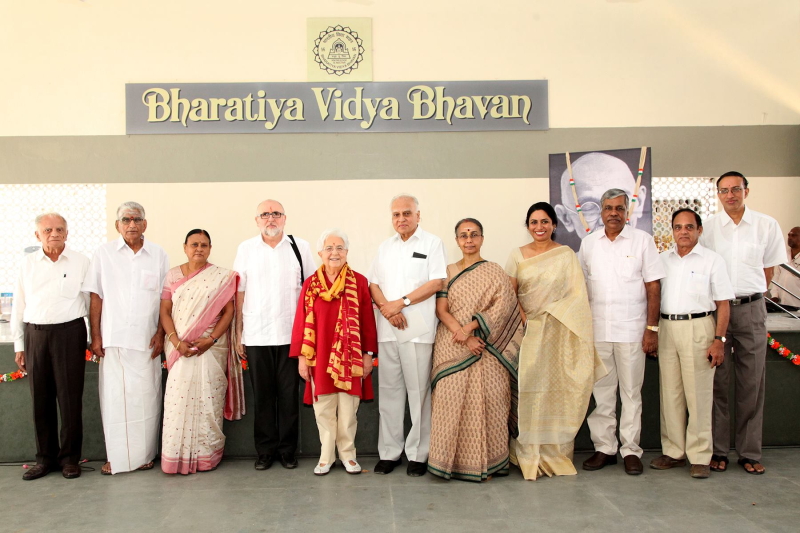
Feb 18, 2016 | Non categorizzato
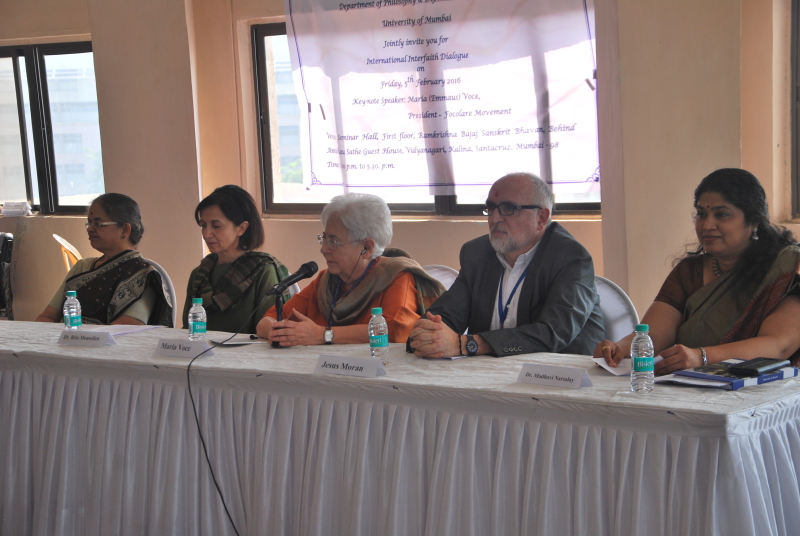
© CSC Audiovisivi – All rights reserved
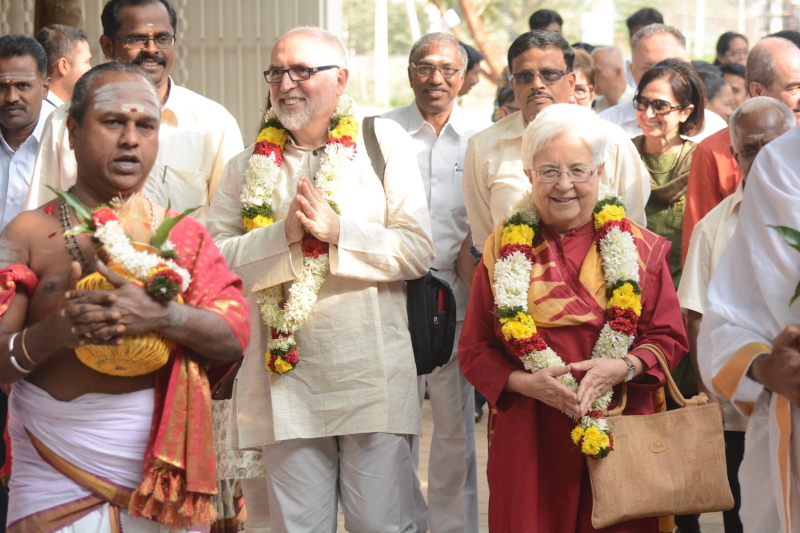
© CSC Audiovisivi – All rights reserved
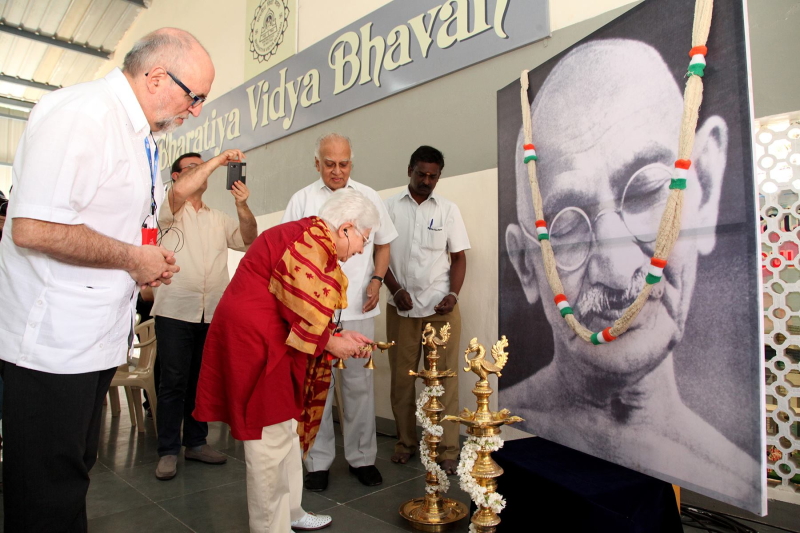
© CSC Audiovisivi – All rights reserved

© CSC Audiovisivi – All rights reserved
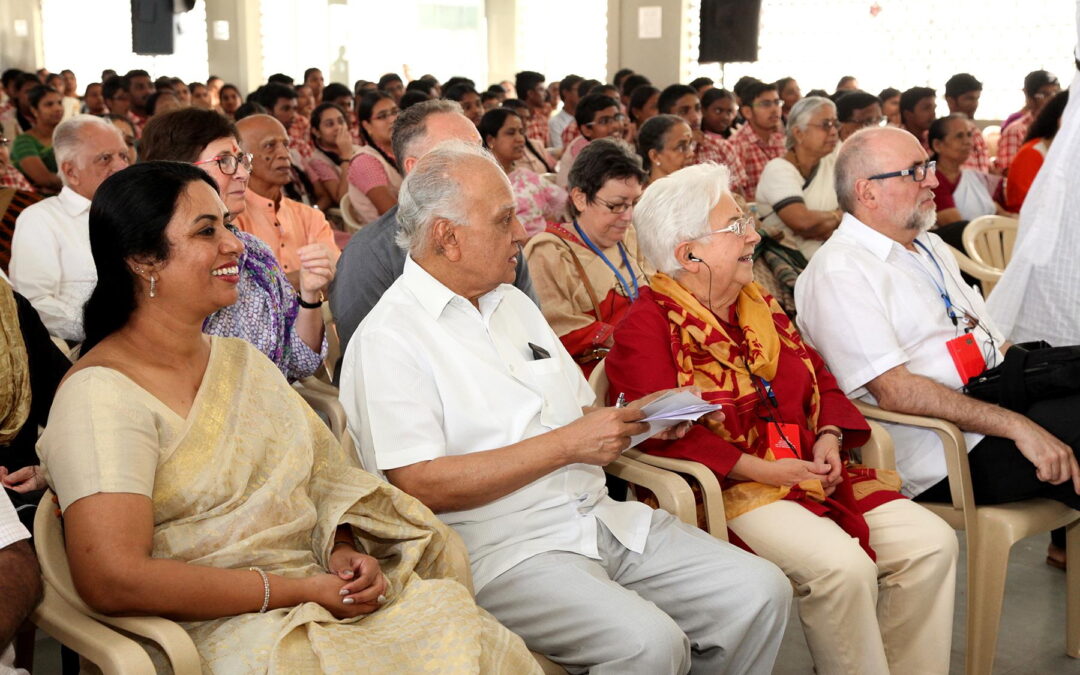
Feb 17, 2016 | Non categorizzato
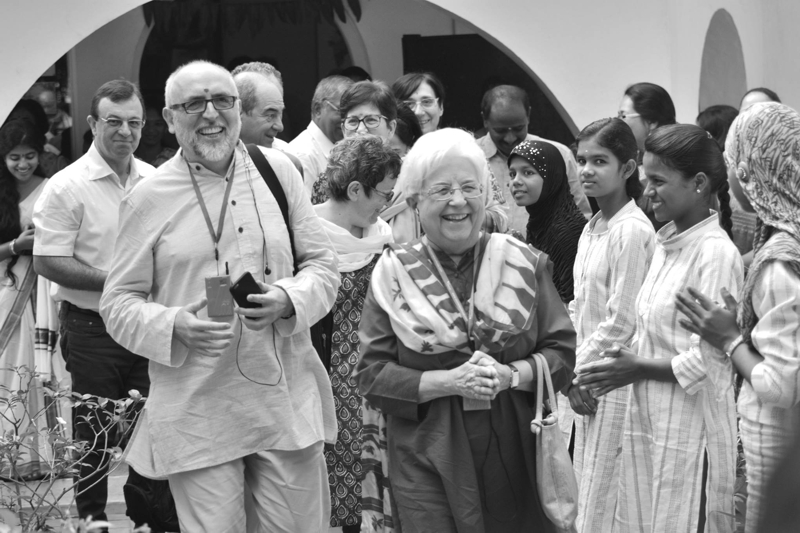
Photo © Donald Dsouza
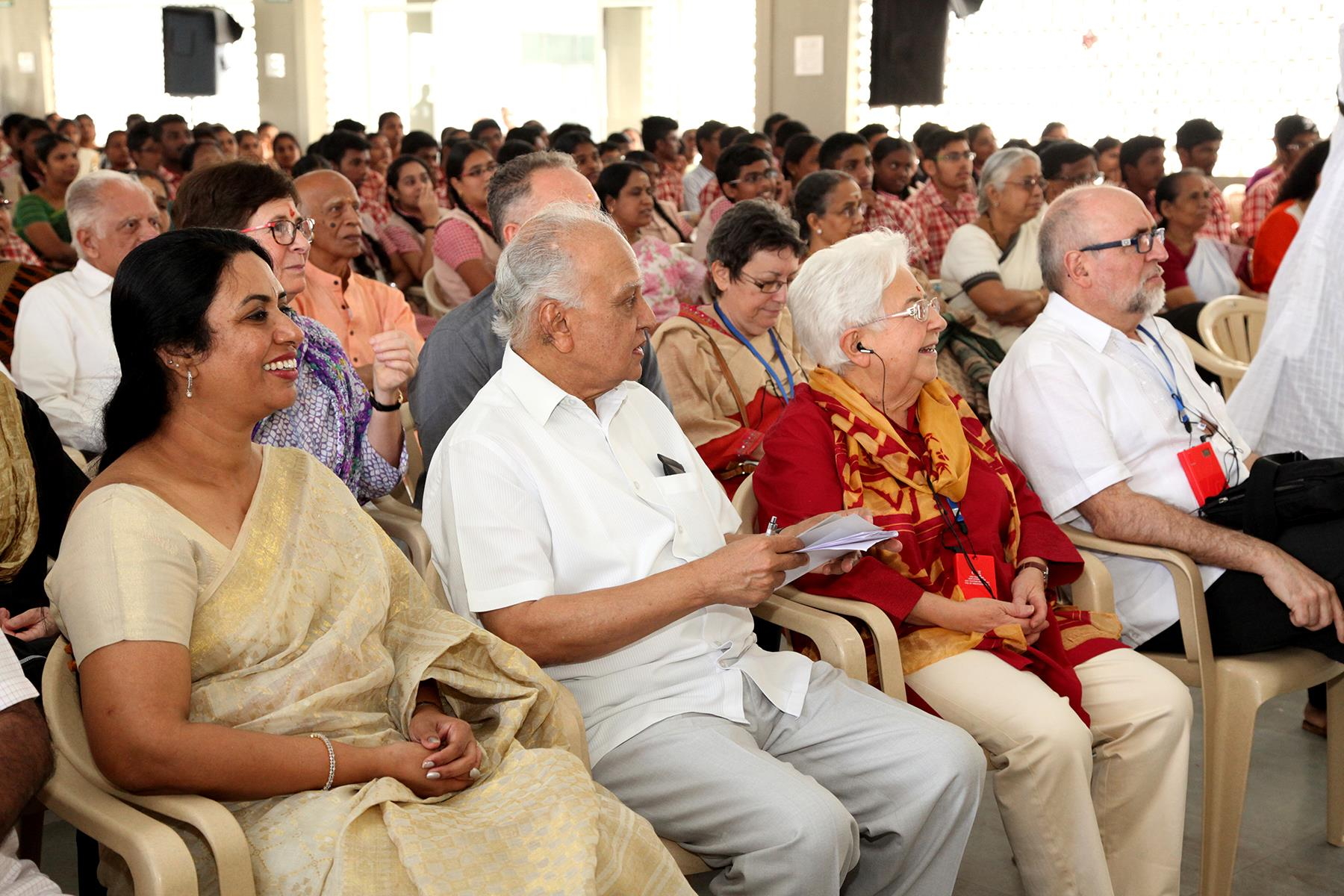
CSC Audiovisivi – All rights reserved
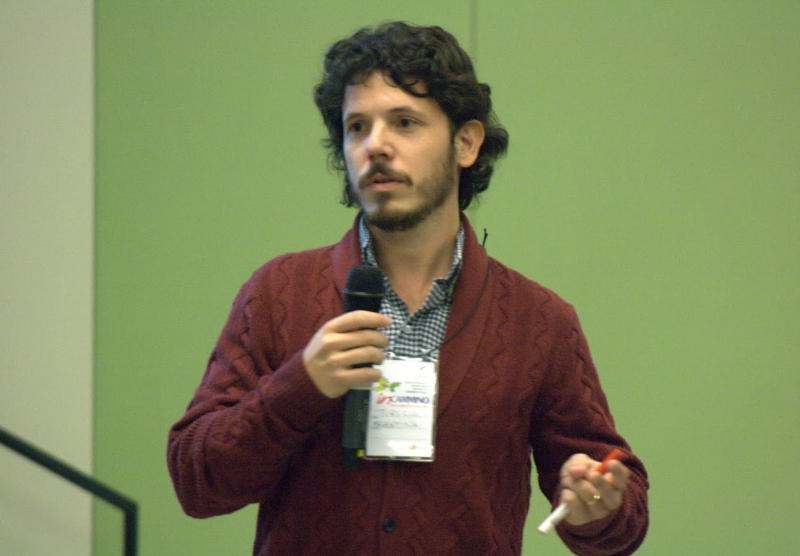
Feb 17, 2016 | Non categorizzato
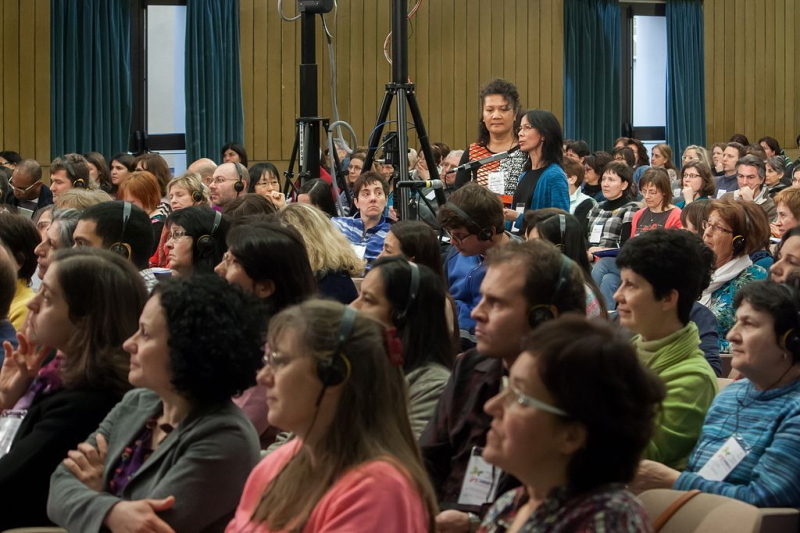 There was overwhelming agreement amongst the 400 youth workers who attended the conference, that they had chosen their profession because of love and not because of the career. Some of the topics discussed included: accompanying adolescents; role of the teacher; educating to do what is difficult; the community as educator. Vince and Make are from Melbourne, Australia. “I’m originally from Futuna – one more step and you fall off the globe!” Make joked. “When I went to visit a small community on the Island of Kiribati, the children were surprised by the presence of a stranger, and then suprised by the fact that I played games with them. I ran for two hours even though I’m no longer the right age that. We didn’t speak the same language, but a special relationship was created between us.
There was overwhelming agreement amongst the 400 youth workers who attended the conference, that they had chosen their profession because of love and not because of the career. Some of the topics discussed included: accompanying adolescents; role of the teacher; educating to do what is difficult; the community as educator. Vince and Make are from Melbourne, Australia. “I’m originally from Futuna – one more step and you fall off the globe!” Make joked. “When I went to visit a small community on the Island of Kiribati, the children were surprised by the presence of a stranger, and then suprised by the fact that I played games with them. I ran for two hours even though I’m no longer the right age that. We didn’t speak the same language, but a special relationship was created between us. 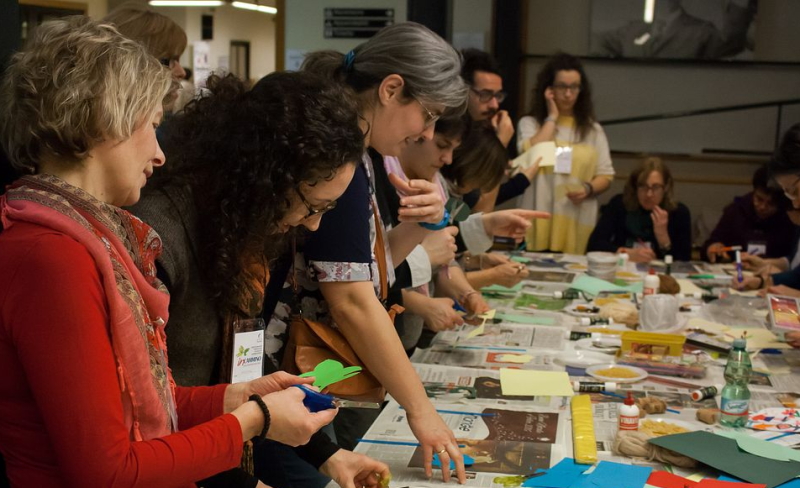 What is their educational model? They call it a person-relationship model in which one is able to love and be loved. It is rooted in the thought of Chiara Lubich. Her influence on the field of education is being developed by a group of researchers in the area of pedagogy and by the Abba School and the Sophia University Institute whose graduates were among the presenters. There were ample offerings for every age group, covering topics such as global education; types of group animators; group dynamics; conflict resolution; investigations on faith and reason; lifestyle and the environment; gender; addiction and mass media. Several interactive activities explored expressing emotions through dance; theatre; puppetting; shaping balloons; arts and crafts; video-making; photography and using shapes and images.
What is their educational model? They call it a person-relationship model in which one is able to love and be loved. It is rooted in the thought of Chiara Lubich. Her influence on the field of education is being developed by a group of researchers in the area of pedagogy and by the Abba School and the Sophia University Institute whose graduates were among the presenters. There were ample offerings for every age group, covering topics such as global education; types of group animators; group dynamics; conflict resolution; investigations on faith and reason; lifestyle and the environment; gender; addiction and mass media. Several interactive activities explored expressing emotions through dance; theatre; puppetting; shaping balloons; arts and crafts; video-making; photography and using shapes and images. 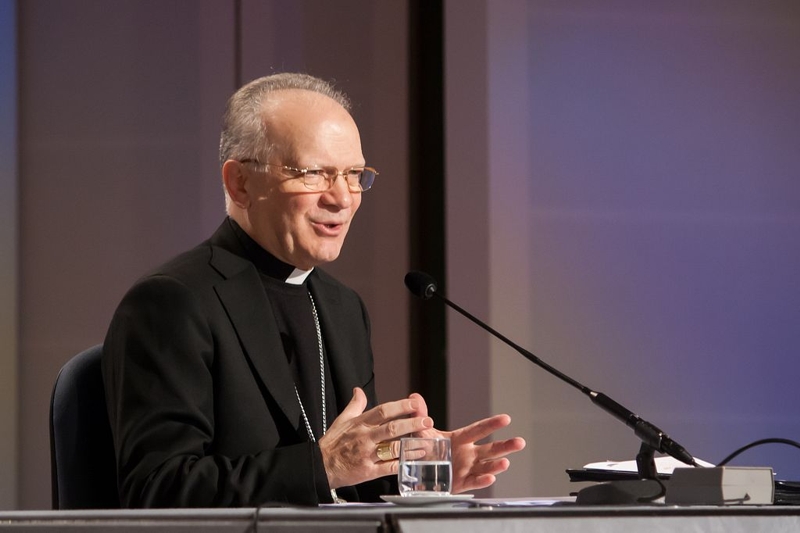 It was all a concrete opportunity to “put head, heart and hands to work,” to experience it and then live it along with the children. This educational method is particularly dear to the heart of Pope Francis (see World Congress on Education, Rome, Italy, November 2015). During his presentation, Msgr Vincenzo Zani, Secretary of the Congregation for Catholic Education offered Pope Francis’s vision for education to all the formators at Castel Gandolfo from February 5-10, 2015.
It was all a concrete opportunity to “put head, heart and hands to work,” to experience it and then live it along with the children. This educational method is particularly dear to the heart of Pope Francis (see World Congress on Education, Rome, Italy, November 2015). During his presentation, Msgr Vincenzo Zani, Secretary of the Congregation for Catholic Education offered Pope Francis’s vision for education to all the formators at Castel Gandolfo from February 5-10, 2015. 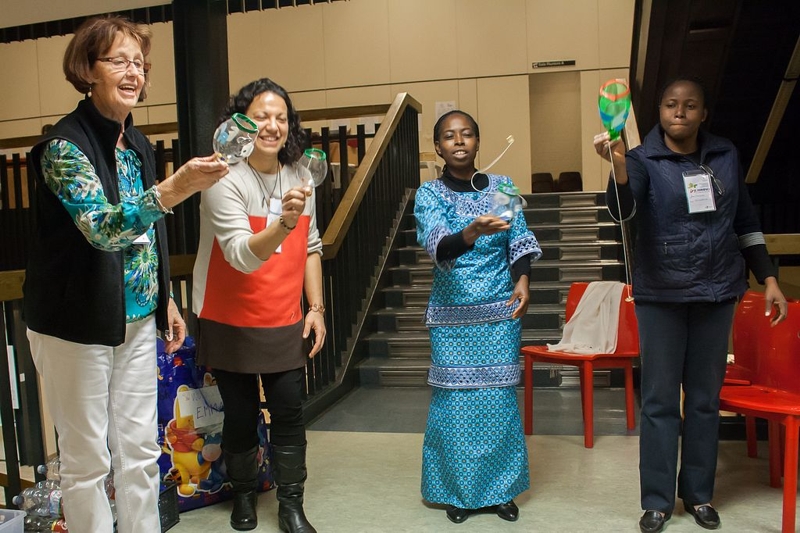 Today’s educators must be master risk-takers, brave explorers, humble builders of relationships – never by themselves but as members of the community in which they operate. Today’s educators experience failures, but never give up, so that they can teach others to never give up. Above all an educator should strive to be authentic, a credible witness. Teachers often find themselves involved with children living through difficult situations. These children suffer because of family instability or violence . . . but at least there is one person in their lives who plants some seeds of hope. It is always possible to begin again, helping them to activate what in the technical jargon is termed resiliance, drawing on one’s own resources to face difficulties, to adapt and to overcome.
Today’s educators must be master risk-takers, brave explorers, humble builders of relationships – never by themselves but as members of the community in which they operate. Today’s educators experience failures, but never give up, so that they can teach others to never give up. Above all an educator should strive to be authentic, a credible witness. Teachers often find themselves involved with children living through difficult situations. These children suffer because of family instability or violence . . . but at least there is one person in their lives who plants some seeds of hope. It is always possible to begin again, helping them to activate what in the technical jargon is termed resiliance, drawing on one’s own resources to face difficulties, to adapt and to overcome.  “There is a need to acquire more skills,” explained Argentinian psychologist Arturo Clariá “also from the fields of sociology and psychology, coming up with strategies for working together, so that we can be responsible companions for our young charges, with our gaze always fixed on the transcendent. In contrast to educators from across the world who are immersed in the problems of the current cultures, in a globalised world that has led to the loss of meaning and self-esteem, and to problems in fulfilling the plan for one’s life. At times you don’t know what to do. How are we to face such a fluid society? The educator is not the holder of knowledge, but the director of an orchestra in which each player can play his or her instrument, and the educator must draw out the harmony from each musician.” This is an educational approach that moves beyond enclosed spaces and reaches the level of feelings, social skills and values: “This is how a culture of brotherhood and peace will be created.” Photo gallery: https://goo.gl/photos/BjmCh1FPnXaxyBQh8 Facebook: In Cammino Educarsi per Educare
“There is a need to acquire more skills,” explained Argentinian psychologist Arturo Clariá “also from the fields of sociology and psychology, coming up with strategies for working together, so that we can be responsible companions for our young charges, with our gaze always fixed on the transcendent. In contrast to educators from across the world who are immersed in the problems of the current cultures, in a globalised world that has led to the loss of meaning and self-esteem, and to problems in fulfilling the plan for one’s life. At times you don’t know what to do. How are we to face such a fluid society? The educator is not the holder of knowledge, but the director of an orchestra in which each player can play his or her instrument, and the educator must draw out the harmony from each musician.” This is an educational approach that moves beyond enclosed spaces and reaches the level of feelings, social skills and values: “This is how a culture of brotherhood and peace will be created.” Photo gallery: https://goo.gl/photos/BjmCh1FPnXaxyBQh8 Facebook: In Cammino Educarsi per Educare
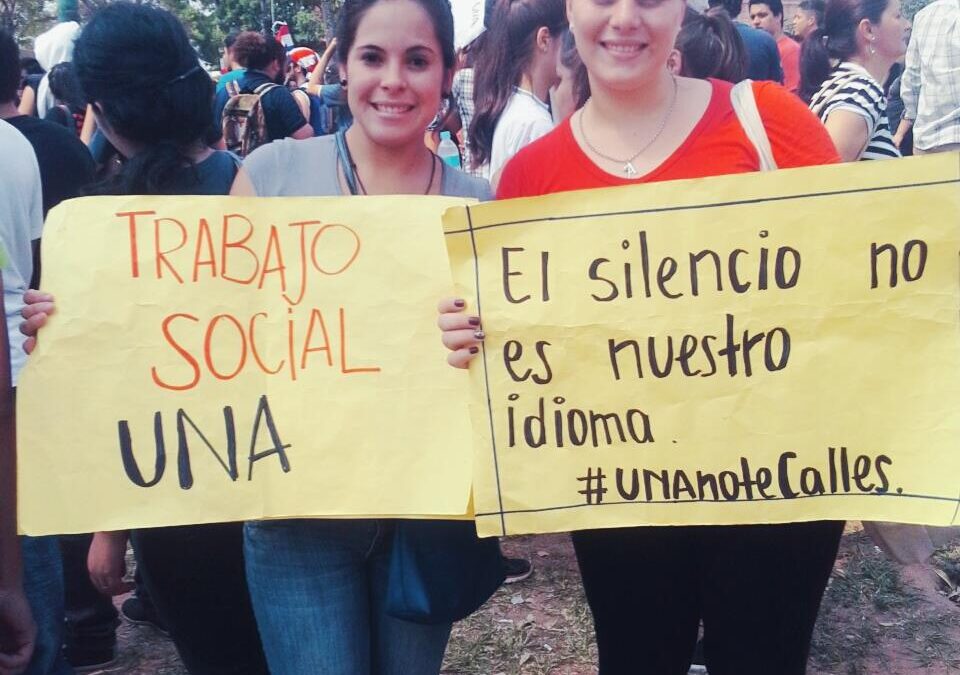
Feb 16, 2016 | Focolare Worldwide
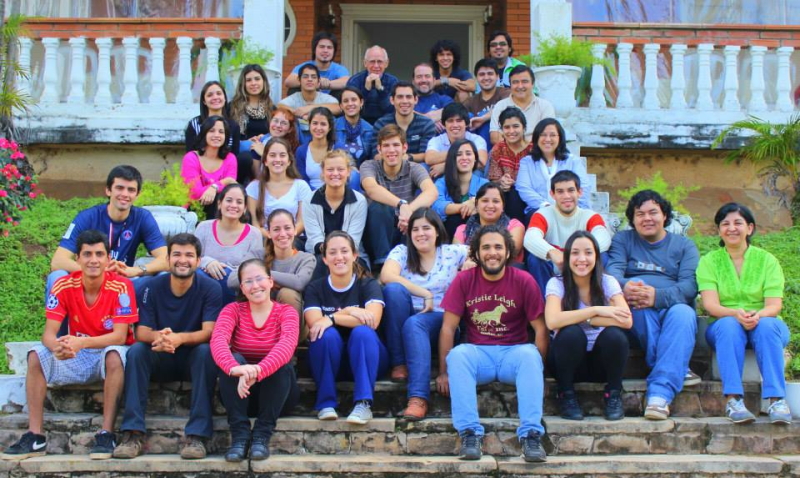 Thousands of university students have denounced the rampaging corruption in the country’s main state university, the Università Nazionale of Asunción (UNA). A long austere spring ended with chain resignations of the academic authorities, and negotiations on the reforms of a statute drafted during the dictatorship. The university youth surprised everyone with their seriousness and organisation. In the month in which the campus was occupied, they created a true and proper “alternative State.” There were watch shifts at the doors, inspection of bags and car boots to prevent the introduction of alcoholic beverages, efficient orders for food and essential services, and oganisation of a supplementary school calendar, with the help of professors and graduating students. And now the schedule of exams has been adjusted so that no one would lose the semester. They furthermore demonstrated intelligence in not allowing themselves to be exploited by anybody. Their reference point and model was Pope Francis who had met thousands of young people in his visit to Paraguay. His appeal to “raise a din and then organise it,” was fully heeded. Among the leaders of the pacific revolt was #UNAnotecalles (“UNA speak up”), the youth of the Focolare. Alejandra and Cecilia, Medicine and Engineering students, respectively, said: “It all started with a sit-in before the Rector’s building, to demonstrate our indignation with regard to the latest reports of corruption. Every day there was a peaceful demonstration during which the mike was passed around to the students, professors and officers. Then came a permanent wake around the building, with a strike of the students to demand the resignation of the Rector and his assistants. The support of the people who provided food and other forms of aid, gave us the strength not to give up our battle, and made us see that it was a struggle for everyone’s good. After 40 days the Rector resigned along with five officers and another 38 were indicted, followed by the resignation of all the faculty deans. What was fundamental for us was to live this phase with all the Gen studying in the UNA university, and also with the others who expressed their support in various ways. Certain of Jesus’s promise to be among us if we unite in His name, we did our best to make it a reality. He was our guiding light in defending the evangelical values of love, truth and justice, and overcoming the many difficult moments. At times it was not easy to control the crowd that seemed to be overwhelmed by emotions. In those instants, when the right thing to do was not clear, we tried to decide together how to act and what decision to make.
Thousands of university students have denounced the rampaging corruption in the country’s main state university, the Università Nazionale of Asunción (UNA). A long austere spring ended with chain resignations of the academic authorities, and negotiations on the reforms of a statute drafted during the dictatorship. The university youth surprised everyone with their seriousness and organisation. In the month in which the campus was occupied, they created a true and proper “alternative State.” There were watch shifts at the doors, inspection of bags and car boots to prevent the introduction of alcoholic beverages, efficient orders for food and essential services, and oganisation of a supplementary school calendar, with the help of professors and graduating students. And now the schedule of exams has been adjusted so that no one would lose the semester. They furthermore demonstrated intelligence in not allowing themselves to be exploited by anybody. Their reference point and model was Pope Francis who had met thousands of young people in his visit to Paraguay. His appeal to “raise a din and then organise it,” was fully heeded. Among the leaders of the pacific revolt was #UNAnotecalles (“UNA speak up”), the youth of the Focolare. Alejandra and Cecilia, Medicine and Engineering students, respectively, said: “It all started with a sit-in before the Rector’s building, to demonstrate our indignation with regard to the latest reports of corruption. Every day there was a peaceful demonstration during which the mike was passed around to the students, professors and officers. Then came a permanent wake around the building, with a strike of the students to demand the resignation of the Rector and his assistants. The support of the people who provided food and other forms of aid, gave us the strength not to give up our battle, and made us see that it was a struggle for everyone’s good. After 40 days the Rector resigned along with five officers and another 38 were indicted, followed by the resignation of all the faculty deans. What was fundamental for us was to live this phase with all the Gen studying in the UNA university, and also with the others who expressed their support in various ways. Certain of Jesus’s promise to be among us if we unite in His name, we did our best to make it a reality. He was our guiding light in defending the evangelical values of love, truth and justice, and overcoming the many difficult moments. At times it was not easy to control the crowd that seemed to be overwhelmed by emotions. In those instants, when the right thing to do was not clear, we tried to decide together how to act and what decision to make.
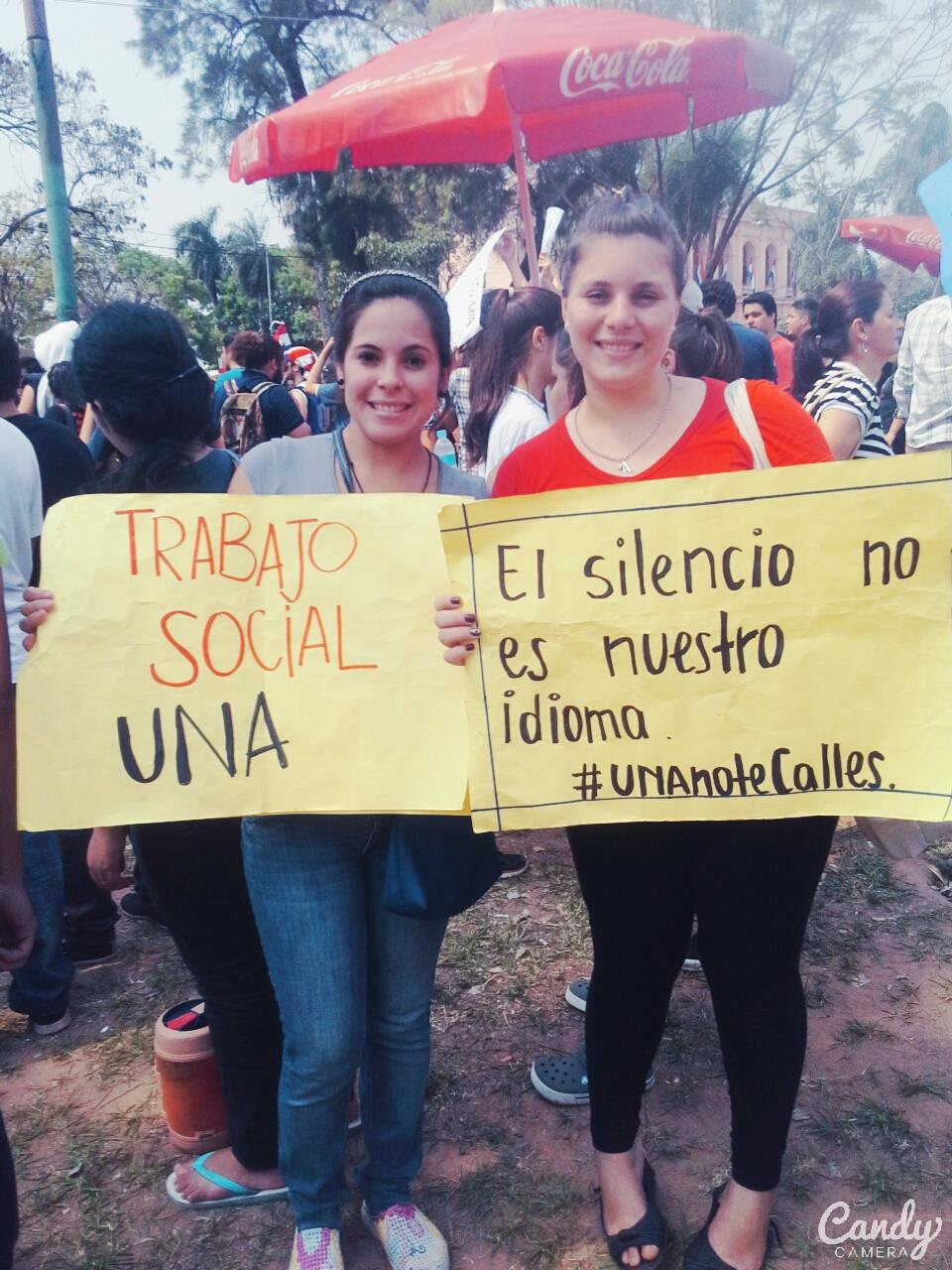
Leticia (left)
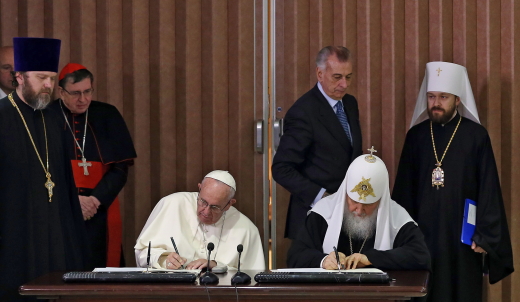
Feb 15, 2016 | Focolare Worldwide
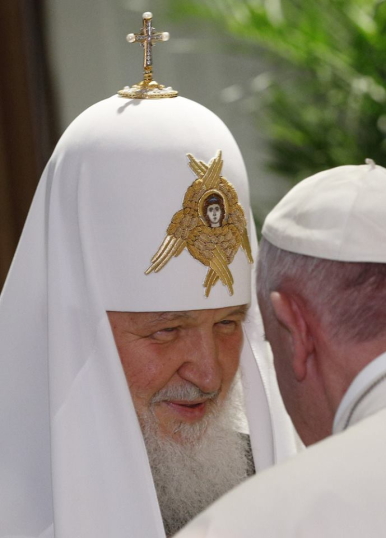 The Airport of Havana, Cuba, hosted the first meeting in history between the Bishop of Rome and the Patriarch of Moscow, on February 12, 2016. It was a fraternal encounter “between bishops’ that “gave an opportunity to listen and understand each other’s positions” said Patriarch Kirill at the conclusion of the meeting. Among the common concerns were the desire for peace and the defence of persecuted Christians around the world. “I felt the consolation of the Holy Spirit in this dialogue,” Pope Francis remarked, with the prospect of “a series of initiatives” to be carried forward together. “We are not competitors but brothers, and this concept must guide all our mutual actions as well as those directed to the outside world,” states the Joint Declaration that was signed by the Pope and the Patriarch. The declaration calls for common efforts between Roman Catholic and Orthodox Christians, and overcoming the historic divergences we have inherited, responding together to the challenges of today’s world. Christians are now victims of persecutions and violence in Syria, Iraq and other Middle East countries. Other challenges include the fight against terrorism, interreligious dialogue, European integration and respect for religious identities. The document also mentions social and ethical topics, with “pastoral” concern, as Pope Francis stressed while speaking with journalists on the flight between Cuba and Mexico: poverty, the breakdown of the family, the right to life (abortion, euthanasia and assisted reproduction), young people and peace in Ukraine. Much of the future of humanity will depend on our capacity to give shared witness to the Spirit of truth in these difficult times,” the document goes on to say.
The Airport of Havana, Cuba, hosted the first meeting in history between the Bishop of Rome and the Patriarch of Moscow, on February 12, 2016. It was a fraternal encounter “between bishops’ that “gave an opportunity to listen and understand each other’s positions” said Patriarch Kirill at the conclusion of the meeting. Among the common concerns were the desire for peace and the defence of persecuted Christians around the world. “I felt the consolation of the Holy Spirit in this dialogue,” Pope Francis remarked, with the prospect of “a series of initiatives” to be carried forward together. “We are not competitors but brothers, and this concept must guide all our mutual actions as well as those directed to the outside world,” states the Joint Declaration that was signed by the Pope and the Patriarch. The declaration calls for common efforts between Roman Catholic and Orthodox Christians, and overcoming the historic divergences we have inherited, responding together to the challenges of today’s world. Christians are now victims of persecutions and violence in Syria, Iraq and other Middle East countries. Other challenges include the fight against terrorism, interreligious dialogue, European integration and respect for religious identities. The document also mentions social and ethical topics, with “pastoral” concern, as Pope Francis stressed while speaking with journalists on the flight between Cuba and Mexico: poverty, the breakdown of the family, the right to life (abortion, euthanasia and assisted reproduction), young people and peace in Ukraine. Much of the future of humanity will depend on our capacity to give shared witness to the Spirit of truth in these difficult times,” the document goes on to say.  “Here in Moscow there is also the feeling that this was an important and historic meeting” writes focolarina Anna Gloria from the focolare in Moscow. The mass media are talking about it a lot. Bishop Paolo Pezzi invited everyone to the Cathedral of the Immaculate Conception to pray for unity. It was quite beautiful. There were Catholics and Orthodox from several movements and communities. Everyone feels that an important step towards unity has been taken.” Despite recent tensions between Moscow and Rome, the Russian Orthodox Church has a long history of seeking the reconciliation of the divided Christian churches. Father Hyacinthe Destivelle said so during an interview with the Vatican Radio. He is in charge of relations with the Slavic Orthodox Churches at the Pontifical Council for Christian Unity and was in Cuba for the meeting. Father Destivelle also explained that “the Russian Orthodox Church is fifth in the traditional order of authority among the 14 autocephalous Orthodox Churches. First position belongs to the Patriarchate of Constantinople, with a primacy of honour. It has a special relationship with the Holy See.” “The significance of the meeting between Pope Francis and Patriarch Kirill can also be seen in light of history with the Russian Orthodox Church,” where it “can act as a bridge between East and West.” Father Destivelle also gave other examples of how the Russian Orthodox Church was an active pioneer in ecumenical relations. It was the first Church to send observers during the Second Vatican Council. During their private meeting, Pope Francis and Patriarch Kirill also discussed the upcoming Pan-Orthodox Council scheduled for June 2016 in Crete. It will ”gather all the Orthodox churches for an Orthodox Synod,” Dr. Dimitrios Keramidas recently explained at an ecumenical school of the Focolare Movement, “this is not an event that is inserted into ecclesial life, but rather the official manifestation of the communional essence of the Church, the on-going and uninterrupted journey of the People of God.” It is a journey towards unity.
“Here in Moscow there is also the feeling that this was an important and historic meeting” writes focolarina Anna Gloria from the focolare in Moscow. The mass media are talking about it a lot. Bishop Paolo Pezzi invited everyone to the Cathedral of the Immaculate Conception to pray for unity. It was quite beautiful. There were Catholics and Orthodox from several movements and communities. Everyone feels that an important step towards unity has been taken.” Despite recent tensions between Moscow and Rome, the Russian Orthodox Church has a long history of seeking the reconciliation of the divided Christian churches. Father Hyacinthe Destivelle said so during an interview with the Vatican Radio. He is in charge of relations with the Slavic Orthodox Churches at the Pontifical Council for Christian Unity and was in Cuba for the meeting. Father Destivelle also explained that “the Russian Orthodox Church is fifth in the traditional order of authority among the 14 autocephalous Orthodox Churches. First position belongs to the Patriarchate of Constantinople, with a primacy of honour. It has a special relationship with the Holy See.” “The significance of the meeting between Pope Francis and Patriarch Kirill can also be seen in light of history with the Russian Orthodox Church,” where it “can act as a bridge between East and West.” Father Destivelle also gave other examples of how the Russian Orthodox Church was an active pioneer in ecumenical relations. It was the first Church to send observers during the Second Vatican Council. During their private meeting, Pope Francis and Patriarch Kirill also discussed the upcoming Pan-Orthodox Council scheduled for June 2016 in Crete. It will ”gather all the Orthodox churches for an Orthodox Synod,” Dr. Dimitrios Keramidas recently explained at an ecumenical school of the Focolare Movement, “this is not an event that is inserted into ecclesial life, but rather the official manifestation of the communional essence of the Church, the on-going and uninterrupted journey of the People of God.” It is a journey towards unity.
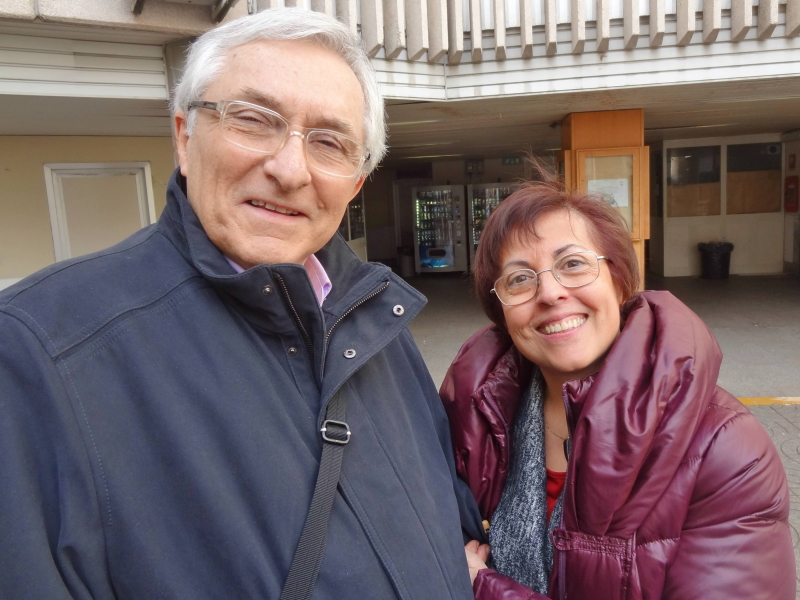
Feb 15, 2016 | Focolare Worldwide
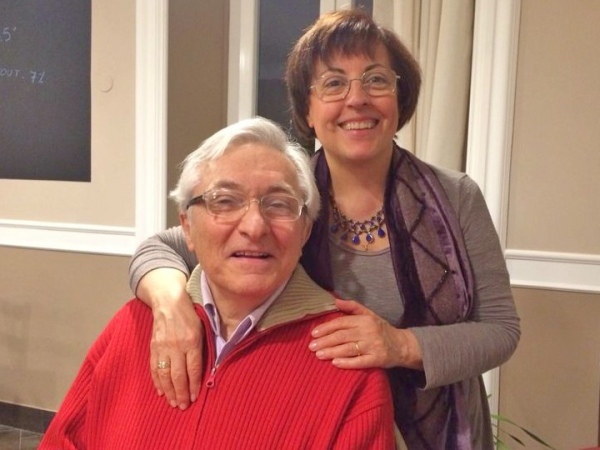 “When I left my home for the bank I was working at 21 years ago, I certainly wasn’t thinking that I wouldn’t return home that night. A strong headache forced my colleagues to take me to hospital. I was 49 years old with a well-established professional career, an upcoming promotion, a beautiful family with three daughters between 14 and 18. Suddenly and unexpectedly I found myself in a wheelchair that I was unable to control because, along with the use of my legs, I had also lost the use of my arms. I had been turned into nothing: I needed help eating, bathing and dressing. . . I was totally dependent on others. I was feeling desperate and anxious, feelings that I tried to reject because I knew they weren’t the solution. From when I embraced the spirituality of the Focolare, I have learned to be totally disposed to God’s will, and even though I didn’t understand the reason for this nightmare, my wife and I wanted to believe that it too was God’s love for me, for us. My daughters also shared in our decision and, right from the first days I found strength and patience that I never dreamed of finding. In a few months I regained the use of my legs and, with great effort and the support of a colleague who accompanied me was able to go back to work for another 7 years. Then I just couldn’t do it anymore.”
“When I left my home for the bank I was working at 21 years ago, I certainly wasn’t thinking that I wouldn’t return home that night. A strong headache forced my colleagues to take me to hospital. I was 49 years old with a well-established professional career, an upcoming promotion, a beautiful family with three daughters between 14 and 18. Suddenly and unexpectedly I found myself in a wheelchair that I was unable to control because, along with the use of my legs, I had also lost the use of my arms. I had been turned into nothing: I needed help eating, bathing and dressing. . . I was totally dependent on others. I was feeling desperate and anxious, feelings that I tried to reject because I knew they weren’t the solution. From when I embraced the spirituality of the Focolare, I have learned to be totally disposed to God’s will, and even though I didn’t understand the reason for this nightmare, my wife and I wanted to believe that it too was God’s love for me, for us. My daughters also shared in our decision and, right from the first days I found strength and patience that I never dreamed of finding. In a few months I regained the use of my legs and, with great effort and the support of a colleague who accompanied me was able to go back to work for another 7 years. Then I just couldn’t do it anymore.” 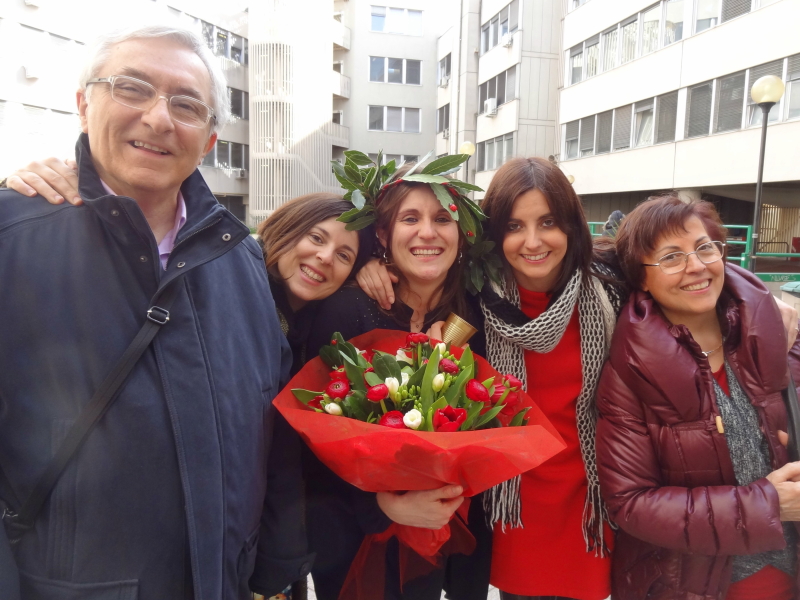 Already then, I wasn’t able to walk because of my handicap, if not just for short distances. I could no longer drive the car, take a shower alone, button my clothing, cut the food on my plate, turn on the coffee machine or embrace my wife and children. I couldn’t do any of those things that required the use of two hands. At times the fear was even bitterer. Fear of not being able go on living as a couple, fear of the solitude, of my fragility in the face of different situations, fear of the doubt about whether I would be able to continue in my role as father, and so on. Now, with much effort I continue with physiotherapy, even though I know that healing isn’t on the landscape. At least it slows the process of debilitation. During these 21 years God has never failed to accompany me with refined faithfulness, delicateness and tenderness that only He knows how to give. Pina and I have learned to let ourselves me carried by Him, to let ourselves be surprised by His Love. And when everything seemed to crumble, or became unstable, deep in our heart we understood that this partaking – in some way – in the mystery of Jesus on the Cross, was a privilege for us. Like Him, we try to overcome the pain by loving everyone around us, experiencing what could be called a ‘divine alchemy’ wherein suffering is like a talent to be turned into love.
Already then, I wasn’t able to walk because of my handicap, if not just for short distances. I could no longer drive the car, take a shower alone, button my clothing, cut the food on my plate, turn on the coffee machine or embrace my wife and children. I couldn’t do any of those things that required the use of two hands. At times the fear was even bitterer. Fear of not being able go on living as a couple, fear of the solitude, of my fragility in the face of different situations, fear of the doubt about whether I would be able to continue in my role as father, and so on. Now, with much effort I continue with physiotherapy, even though I know that healing isn’t on the landscape. At least it slows the process of debilitation. During these 21 years God has never failed to accompany me with refined faithfulness, delicateness and tenderness that only He knows how to give. Pina and I have learned to let ourselves me carried by Him, to let ourselves be surprised by His Love. And when everything seemed to crumble, or became unstable, deep in our heart we understood that this partaking – in some way – in the mystery of Jesus on the Cross, was a privilege for us. Like Him, we try to overcome the pain by loving everyone around us, experiencing what could be called a ‘divine alchemy’ wherein suffering is like a talent to be turned into love.  God took me/us by the hand and, little by little revealing his plan for us, led us into deep intimacy with Him among us, making us understand the mystery of suffering – in the light. And what could be considered a limit has been transformed into richness, what could have stopped us has been turned into a race. Not even an invasive handicap can take away the possibility of being a tool in God’s hands for our neighbor.” Giulio Ciarrocchi
God took me/us by the hand and, little by little revealing his plan for us, led us into deep intimacy with Him among us, making us understand the mystery of suffering – in the light. And what could be considered a limit has been transformed into richness, what could have stopped us has been turned into a race. Not even an invasive handicap can take away the possibility of being a tool in God’s hands for our neighbor.” Giulio Ciarrocchi
 In El Espinal, a town in the province of Salta, Northern Argentina, 35 young people aged 18 to 30 from Argentina and Paraguay spent time together from 3 to 11 January, for a low-cost holiday but of “elevated levels of unity,” as they called it. In fact, also the Pastoral for Tourism –Programme for the Development of Solidal Tourism of that region also signed up for this project. This concerned firstly, living with the community and youth of the place, sharing their work in the tobacco fields with the beehive breeders and weavers, and also the typical difficulties of daily living in the countryside: cold water, lack of electricity, the mud that seems to seep through everywhere… The first point was: leaving behind commodities and prejudice. The Golden Rule “Do to others what you would like others to do to you” expressed in a nutshell what the youth of the Focolare wanted to fulfill in that community. But how were they supposed to accomplish it? It was first of all through an infinity of simple acts of love, and then with a cinema forum, meetings, an excursion, moments of relaxation, eating, dancing and singing together.… But the message was conveyed also through theatre plays that showed how El Espinal would be if everyone lived this simple rule. And who knows why this was so – perhaps for that reality “give and you shall be given” which always comes true – a competition of love triggered, where all gave their best. Maga recounts: “We will never forget how Pilar, a weaver, brought the best set of cutlery she had, to offer us a savoury soup, not to mention the ladies who set their chores aside to come and bake bread with us, and the enthusiasm of the boys and girls who fried doughnuts until late t night to make us feel at home. Then there were those who hosted us in their homes, giving us all they had to make us comfortable. There were so many new faces: and in each was Jesus who came towards us every time.” But the so-called holiday also had another objective, and this was to engage in a project to develop the Tourism Pastoral, which consisted in helping the population to see the touristic potential of their town. This was the main aim behind the organisation of activities that could later be transformed into concrete proposals for future visitors: trekking along the river, horseback riding, tractor excursions, and sight-seeing in the enchanting and hidden places of El Espinal.
In El Espinal, a town in the province of Salta, Northern Argentina, 35 young people aged 18 to 30 from Argentina and Paraguay spent time together from 3 to 11 January, for a low-cost holiday but of “elevated levels of unity,” as they called it. In fact, also the Pastoral for Tourism –Programme for the Development of Solidal Tourism of that region also signed up for this project. This concerned firstly, living with the community and youth of the place, sharing their work in the tobacco fields with the beehive breeders and weavers, and also the typical difficulties of daily living in the countryside: cold water, lack of electricity, the mud that seems to seep through everywhere… The first point was: leaving behind commodities and prejudice. The Golden Rule “Do to others what you would like others to do to you” expressed in a nutshell what the youth of the Focolare wanted to fulfill in that community. But how were they supposed to accomplish it? It was first of all through an infinity of simple acts of love, and then with a cinema forum, meetings, an excursion, moments of relaxation, eating, dancing and singing together.… But the message was conveyed also through theatre plays that showed how El Espinal would be if everyone lived this simple rule. And who knows why this was so – perhaps for that reality “give and you shall be given” which always comes true – a competition of love triggered, where all gave their best. Maga recounts: “We will never forget how Pilar, a weaver, brought the best set of cutlery she had, to offer us a savoury soup, not to mention the ladies who set their chores aside to come and bake bread with us, and the enthusiasm of the boys and girls who fried doughnuts until late t night to make us feel at home. Then there were those who hosted us in their homes, giving us all they had to make us comfortable. There were so many new faces: and in each was Jesus who came towards us every time.” But the so-called holiday also had another objective, and this was to engage in a project to develop the Tourism Pastoral, which consisted in helping the population to see the touristic potential of their town. This was the main aim behind the organisation of activities that could later be transformed into concrete proposals for future visitors: trekking along the river, horseback riding, tractor excursions, and sight-seeing in the enchanting and hidden places of El Espinal.  Among the breathtaking landscapes, sudden climate changes, the sun, animals and insects – at times not valued – everyone felt they could “feel God’s presence and the embrace of his creation” and also the relationships established among the youth, which were really enriching. In short, they spent a different type of holiday in the beautiful province of Salta, while adhering to Pope Francis’ invitation to live the Gospel in the outskirts. Before returning to their cities, they expressed their impressions: “I learnt a lot of things: to be happy with the little we have and not to complain, and live the golden rule. I felt loved and welcomed. All has left a deep mark in me. It was the best way to start the year. Thanks to you all, I have come closer to God.” Other impressions: “We shall leave with our hearts full of stories, experiences, their values, life, light and joy. I again discovered that if we live together for the others, everything else will come as an extra enrichment.” But also the local youth expressed themselves: “You are the best friends Jesus has given me.” “You have filled us with smiles, joy and peace.” Dominga wrote a prayer which she shared with us: “Thank you Jesus for being here and for giving me so many brothers as a gift. I discovered You in each one of them. Lord, teach us to dream big, and of beautiful things that expand our hearts.”
Among the breathtaking landscapes, sudden climate changes, the sun, animals and insects – at times not valued – everyone felt they could “feel God’s presence and the embrace of his creation” and also the relationships established among the youth, which were really enriching. In short, they spent a different type of holiday in the beautiful province of Salta, while adhering to Pope Francis’ invitation to live the Gospel in the outskirts. Before returning to their cities, they expressed their impressions: “I learnt a lot of things: to be happy with the little we have and not to complain, and live the golden rule. I felt loved and welcomed. All has left a deep mark in me. It was the best way to start the year. Thanks to you all, I have come closer to God.” Other impressions: “We shall leave with our hearts full of stories, experiences, their values, life, light and joy. I again discovered that if we live together for the others, everything else will come as an extra enrichment.” But also the local youth expressed themselves: “You are the best friends Jesus has given me.” “You have filled us with smiles, joy and peace.” Dominga wrote a prayer which she shared with us: “Thank you Jesus for being here and for giving me so many brothers as a gift. I discovered You in each one of them. Lord, teach us to dream big, and of beautiful things that expand our hearts.”





















